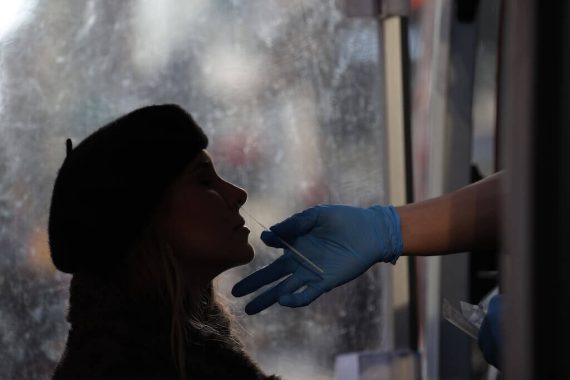Almost immediately after the announcement had been made that a new variant of COVID19 – Omicron, as it was later named by the World Health Organization – had been identified, wealthy northern nations rushed to impose travel bans on a number of southern African countries and, later on other African nations as well.
In some very undiplomatic language from African governments, the move was labelled racist, hypocritical, unsupported by science, “travel apartheid” and even “swart gevaar” – particularly because these same northern states did not impose similar bans on each other, despite their infection rates being hugely higher than in southern Africa. The opprobrium was subsequently also extended to countries of the global South that also imposed travel restrictions on southern African states.
It is difficult to believe that the quick actions of the governments imposing the restrictions were not racist; it is even more difficult to believe now it is known that many of these countries already had cases of the Omicron variant before it had been identified in Botswana and South Africa, and seemingly without any spread from southern Africa.
The drama around these travel restrictions began when, on November 23, scientists from Botswana uploaded three Sars-CoV-2 genome sequences to a public database that looked different from the other 96 uploaded that day, which were of the Delta variant. The database had been receiving regular uploading of such sequences since March 2020. On the same day, a South African team uploaded seven genomes that were almost identical. Scientists around the world began discussing the new variant and, within three days, the WHO had named it Omicron.
The teams from the two southern African countries alerted the world because of the need for rapid responses to COVID19 and its various variants, despite the fact that they understood the risks, as indicated by a tweet from a member of the South African genomics team, Tulio de Oliveira. Announcing the variant, he added that the world should support these efforts by South Africa “and not discriminate or isolate it! By protecting and supporting it, we will protect the world!”
Nevertheless, by November 24, dozens of countries imposed travel restrictions not just on South Africa and Botswana where Omicron had been detected, but also on other southern African countries with no confirmed cases: eSwatini, Lesotho, Malawi, Mozambique, Namibia and Zimbabwe. Angola and Zambia were subsequently added on, and, later Nigeria and Egypt.
The charge against southern Africa was led by the U.K., and quickly followed by the U.S., France, Canada, the Netherlands, Belgium, Norway, Australia and Japan and numerous states of the global South, including India, Turkey, the UAE, Qatar, and a few African states.
The Omicron variant has since been identified in almost all these countries, yet they, to date, have not imposed travel restrictions on each other. What is even more telling for Africans is that, by 30 November, the health authorities of many of these European states – particularly the Netherlands, Belgium and Germany – announced that Omicron had been present in their countries as far back as November 19, suggesting that it had already been spreading in Europe days before its detection in Botswana and South Africa. Even these announcements did not convince them to ease the restrictions, which still persist by mid-December, or to acknowledge the Botswana-South Africa contribution to the European understanding of the new variant.
Shockingly, some states went even further with their racist responses to Omicron. Canada, for example, demanded that their citizens returning home from South Africa must get pre-departure Covid tests from “a third country.”
Shockingly, some states went even further with their racist responses to Omicron. Canada, for example, demanded that their citizens returning home from South Africa must get pre-departure Covid tests from “a third country”, implying that they did not trust the South African tests.
Interestingly, South Africa, with one of the best developed PCR testing networks in the world, probably has better testing capacity than Canada. South Africa’s established infrastructure was established because of its battle with HIV/AIDS, and the country now treats the largest number of AIDS patients on an ongoing basis in the world.
This did not prevent Omicron being referred by western media as the “South African variant” or “the virus from Africa”. A Spanish publication, Tribuna Albacete, published a cartoon of a boat with the South African flag named Omicron filled with caricatured Africans shaped as viruses, approaching Europe, thus combining its racism, xenophobia and hatred of refugees into one image.
Some of this racism was reminiscent of the outbreak of HIV in Africa. In 2001, the head of USAID opposed funding ARVs for Africans, suggesting we would not be able to maintain a disciplined treatment regime because we did not “know what watches and clocks are”.
Many African leaders – especially in southern Africa – have responded with (in some cases uncharacteristic) anger. South Africa’s president, Cyril Ramaphosa, and foreign minister, Naledi Pandor, were, perhaps, most forthright on the issue. Ramaphosa, during a recent tour of West Africa, called the travel restrictions “harsh”, “unfair” “arbitrary and discriminatory”, “unscientific” and “counter-productive”, and suggested that the leaders of Nigeria, Ghana, Senegal and Cote d’Ivoire agreed with him. He also evoked the colonisation of Africa to make his point.
Recommended
“[The world] says, ‘No, we know what is good for you, we just want you to do fill-and-finish [of vaccine doses], that’s it,” Ramaphosa said at the opening of the Dakar International Forum on Peace and Security. “We say, ‘We no longer want that. You did that long ago when you colonised us, and when you raped and pillaged our countries’. We say ‘no’ now, we have the capability [to manufacture vaccines] and we want to make full use of it.” Africa, he said, wanted to do business with the West on a respectful basis, but “maybe that is why we were colonized, because we respect too much, and [now] we say, ‘Respect us as well.’”
The South African president said he agreed with UN secretary-general Antonio Guterres that the travel restrictions were “travel apartheid.”
The South African president said he agreed with UN secretary-general Antonio Guterres that the travel restrictions were “travel apartheid”, and drew attention to a term previously used by South Africa’s apartheid government: “Swart Gevaar” – Black danger/threat. “It is an Afrikaans language term used by our former oppressors to scare the white population about the perceived threat of black majority rule, and to keep themselves in power.”
His criticism was not limited to northern states; he accused certain African states of behaving “like our former colonizers”. He was referring to Rwanda, Mauritius, Seychelles and Egypt, which followed the European example and also imposed travel restrictions on southern Africa.
On 4 December, the U.K. added Nigeria to its “red list”, followed by other states. The Nigerian health minister responded with similar language to Ramaphosa, and Nigeria’s aviation minister, Hadi Sirika, announced on 12 December that he planned, in retaliation, to ban flights from Argentina, Britain, Canada and Saudi Arabia.
For Africans in general, and southern Africans in particular, there is no question that the response of northern states to the detection of the Omicron variant is racist, with no concern by, especially Europeans, for the destruction of African economies and livelihoods. Suddenly, overnight, many middle- and upper-class Africans discovered the cold, unwelcoming reception, and lack of concern for African lives, that poorer Africans had discovered for decades in their attempts to migrate to Europe.





